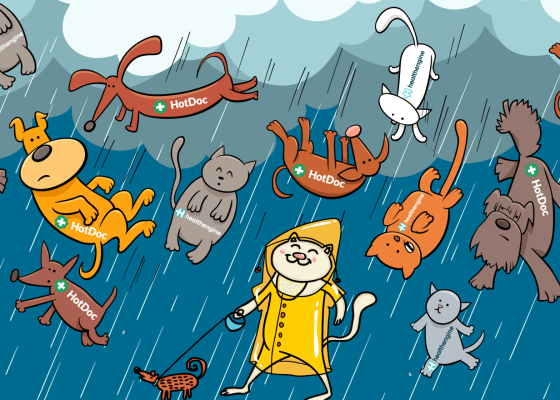We’ll stay focused on rolling out a stack of new products and features and leave the speculation to others.
This week has seen a lot of media attention for Healthengine and the patient engagement space that we operate in.
I am not going to waste any time countering this speculation, other than to make the point that it is just that – speculation – and we remain focused on building the best patient engagement software for Australian healthcare practices.
I did, however, want to respond to the recent op-ed from Jeremy Knibbs on the prospects for my company and the wider industry. Needless to say, I respectfully disagree with some of the points in his article, and I thank him for giving me the opportunity to offer a different perspective.
First and foremost, the software that Healthengine is building is so much more than simply a booking engine, with a growing suite of patient engagement functionality.
We see our role as improving the front-office efficiency for any medical practice across primary and secondary care, and providing innovative tools to make it easy, private and effective to engage with their patients.
Critically, and unlike some of our competitors, we are not in the business of providing care, be that telehealth or anything else, nor do we build clinical software. We see that as the role of our customers and their practice management software, many of which are our partners, and frankly we are focused on solving different problems.
Obviously, that includes providing the best online booking functionality in Australia, but we offer so much more than that, including patient waitlist functionality, automated recalls and reminders, payments, custom forms and a wide range of other features specific to each healthcare vertical – all private by design.
Most recently, it also includes our AI receptionist Helen, who can make, change and cancel appointments and answer patient questions – all with comprehensive knowledge about the respective practice’s doctors and policies, so patients never have to wait on hold.
Critically, and consistent with our position above, Helen will never disclose private information or answer clinical questions, instead focusing exclusively on administrative tasks and deferring to the front desk for anything best dealt with by a nurse or doctor.
I appreciate that there is a lot of hype around AI in our industry, but the benefits that AI can deliver for patient engagement are profound. We now have the ability to automate and improve the effectiveness of so many front-office tasks, allowing busy reception staff to focus more on the people in their waiting rooms, and I am genuinely excited about our product roadmap in the months ahead.
My second point of respectful disagreement with Jeremy is longstanding.
Earlier this year he argued that the PMS providers can easily build out booking engine functionality and effectively eat our lunch.
Related
If all Healthengine offered was online bookings then I would agree, but as outlined above our software provides so much more than that, while Healthengine as a destination for patients has taken more than a decade to build.
We have spent 16 years establishing Healthengine as a trusted place for consumers to manage their entire care team – across GP, dental, allied, specialist and pharmacy. We have over 10,000 practices and almost 30,000 practitioners available on the platform, creating more healthcare provider choice for Australian patients than anywhere else.
We have also made a substantial investment in marketing and optimising Healthengine to be discoverable on the web, and all our healthcare provider customers benefit from that investment, making us more of an effective destination to acquire new patients than any other channel.
We facilitate around a million healthcare bookings a month, growing by over 30% in the last year alone. Over half of those are made with our app to make it easy to book in with their GP, dentist, or pharmacist, as well as a wide range of allied health professionals and specialists.
Obviously, the rise of AI has the potential to impact this as more patients use ChatGPT, Gemini, Claude, etc. to find care, but this is likely to strengthen our position and further improve the benefits for our customers.
I won’t reveal all our secrets, but we are investing a huge amount in our platform to ensure it remains as discoverable and useful across these new and emerging channels, and ultimately reducing our industry’s reliance on traditional search engines in the medium term.
This is a substantial undertaking utilising our dedicated AI software development team, providing a benefit to our customers that do not have this expertise in house.
It is also an investment that doesn’t make sense for our trusted PMS partners that are B2B and do not have a recognisable consumer brand. Again, we are solving different problems for our customers, which ultimately strengthens our PMS partnerships.
In the coming months we will be rolling out a stack of new products and features, many of which are enabled by AI, and I am very confident that this will add a huge amount of value to our customers and the wider healthcare industry.
We’ll stay focused on that and leave the speculation to others.
Dan Stinton is the CEO of Healthengine.
About Healthengine:
Healthengine’s mission is to improve access to healthcare by helping Australians find and connect with all care providers. It is Australia’s leading healthcare provider marketplace, bringing together millions of Australian patients, and more than 10 thousand practices and 30 thousand practitioners across GP, dental, allied health, specialist, and pharmacy and growing. Almost 100 million healthcare bookings have been made on the platform since it was founded in 2006.




